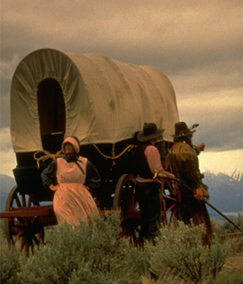
Here you have it, the classic picture most people would conjure if you say the word,"pioneer". Conestoga wagon, strong, independent folk, colorful guide replete with buckskin and feather. Rugged individualists forging a new future for America.
It certainly took courage, naievete or flat out desparation to strike out for parts relatively unknown. At least unknown to white folks. of course the places they headed for weren't unknown to the people who already lived there, the people we called 'Indians'. The people who typically referred to themselves, 'the people' in their various languages.
I was listening to NPR the other morning and heard an announcement for the South Dakota State Historical Society 2009 History Conference entitled, "Immigration:A New Beginning". The subject is white folks moving onto the plains of what would eventually become South Dakota beginning around 1855. What most Americans would call 'pioneers'. I got to thinking about that term, 'immigration'. An immigrant is defined as " A person who comes to a country where they were not born in order to settle there." While this an apt term for the folks who went into this part of the country before it was even a territory, the concept doesn't address the legality of this action. I suspect the conference won't either. In 1855 there were no treaties ceding any land to the US in what we now call South Dakota. There was the so-called Louisiana Purchase wherein the United States gave France a chunk of dough to buy land that France neither owned nor controlled militarily. In other words, it wasn't France's land to sell. There were tens of thousands of people living in the area 'sold' by France, including the Mandan, Arikira and Oceti Sakowin(Seven Council Fires, commonly called 'Sioux'). The first treaty signed by any of the Oceti Sakowin was in 1855 and it was a Yankton action, one of the Seven Council Fires, not the consensus of leaders of all seven of the Oceti Sakowin, much less that of other nations living there. Actually, it was the action of one leader, Strike-the Ree. And this man's decision was not binding on any of the other people of the Yankton nation. The people were not bound by any one else's decisions except in limited circumstances such as a hunt or war.

Smutty Bear who opposed it; Charles Picotte who was the interpreter and profited from it; and Strike-the-Ree, Yankton chief who was resigned to white settlement saying that, "The white men are coming like maggots. It is useless to resist them....Many of our brave warriors would be killed, our women and children left in sorrow, and still we would not stop them".(SD State Historical Society)
The U.S. understanding was that this one man had the right to give away close to 38,000 square miles of land, even though the leader of similar or equal rank sitting next to him said no. Of course the U.S knew this was not valid, but it served the purpose of providing a legal-seeming pretext. So what it boils down to is that the US bought the area from a country that didn't own it and then got a treaty signed by one leader from one group of the people who lived there who had no authority to give any land.
My point in all of this is that historical accuracy might dictate a somewhat different term than 'immigrants' or 'pioneers'. While I wouldn't suggest the South Dakota State Historical Society use the term apparently preferred by Strike-The-Ree, "maggots", to refer to the white incursion, 'colonizers' would be more appropriate. 'invaders' would work even better, but most accurate of all would be 'thieves' and unfortunately, all of us whose ancestors came from elsewhere(excluding descendants of slaves) are the benefactors of those thefts. I wonder if the SDSHS will address this in the confeence.
Native American Awareness Week is April 13-19



No comments:
Post a Comment